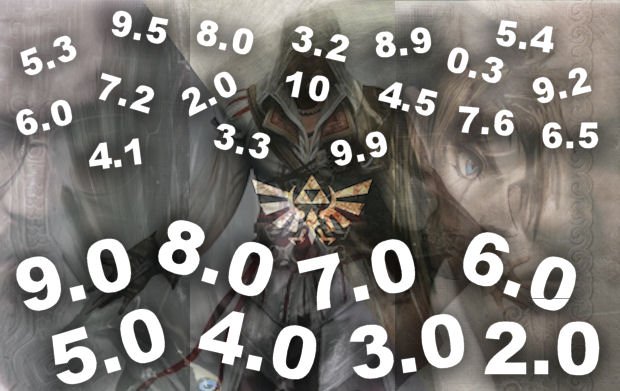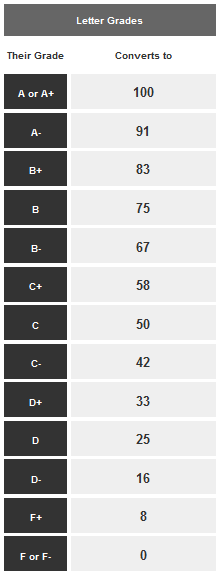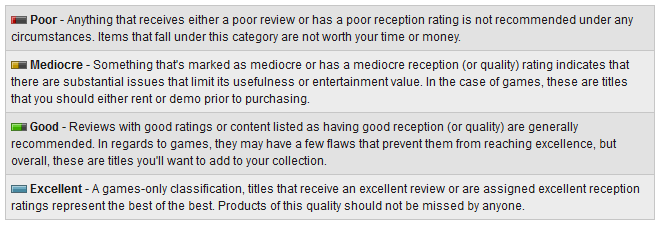Finally, a solution we can all agree on.
There have been two topics floating around MyIGN lately: Project Mars and the Metacritic Problem. Both topics have been highly debated, with tons of people taking both sides on both topics. Some are calling for an end to review scores in general. Others want a new scale, like a 5-point scale or a 10-point scale. Frankly, the community has been completely split and torn apart because of these issues.
But I've found a unified solution, one that fixes both Project Mars and the Metacritic Problem at the same time, all while satisfying both sides of the community. How, you ask? One word: ReviewTrax.
WOAH HOLD UP! REWIND! For those who haven't been following IGN lately, you'd probably be super confused right now. What's Project Mars? And what exactly is the Metacritic Problem? Well, these next two paragraphs will tell you exactly that...
Project Mars is a project by IGN to once again reform their game-scoring policy. You may remember just a few years ago IGN went from a 100-point scale to a 20-point scale, because, and I quote, "[IGN's] goal has always been to help you make a good purchase decision and, frankly, you don't need scores broken down to such a minute level [the 100-point scale] to get the point across." It's a good point, but the issue with review scores continues to persist throughout the gaming industry. You can read more about the origins of Project Mars here.
The Metacritic Problem is in some ways related to Project Mars, because, quite frankly, Project Mars was started partly to combat the Metacritic Problem. What is the Metacritic Problem, you ask? Here, let me explain. Metacritic is a score-aggregating site for movies and video games, and by that I mean they gather up all the scores of a particular product and averages them out to a nice little number. But the problem with this process is that people use Metacritic as a sort of "final say" on the quality of a product and automatically turn away from a game that scores lower than, say, and 80, which in turn means that games that receive decent scores (read: games that score around the 70's) never get played, leading to, of course, layoffs and company closures. You can read more about the Metacritic Problem here.
Both of these issues deal with the same question: what should be done with review scores? Should they be abolished? Reformed? Should sites like Metacritic be banned? Should sites like IGN pull their scores from Metacritic? There are tons of questions, and yet no unified answer. That is, of course, until now.
ReviewTrax: exactly what is it? For those who don't know (a.k.a. most of you), ReviewTrax is a game-aggregating site that functions much like Metacritic, but with several major differences: instead of the numbered 0-100 scale that Metacritic uses, ReviewTrax uses a worded 1-4 scale and bases the scores on the tone of the review, not the review score itself. Confused? Let me explain.
Metacritic currently uses a numbered 0-100 scale and bases these scores from the scores the reviewers give themselves. So a score of 9.0 on IGN would convert to a 90 on Metacritc. This poses a problem to sites with a non-numbered scoring method (1UP.com uses a A-F grade scale) and those that don't give a final score to games at all. ReviewTrax is different in that they use a tonal scale to determine if the reviewer feels a particular game is either poor, mediocre, good, or excellent (the 4-point worded scale). This means a game that receives a B- from 1UP (which translates to a 67 on Metacritic) can receive a more reasonable score of "good" on ReviewTrax.
And now it's time for me to tell you why IGN should follow ReviewTrax's path. Again, I'm going to quote from IGN's review guide:
"Our goal has always been to help you make a good purchase decision..."
... and, frankly, you don't need scores broken down to such a minute level to get the point across. Yes, this quote's existence serves only to give a good reason why IGN decided to divide by 5 and move from a 100-point scale to a 20-point scale. Well, IGN, I ask that you divide by 5 one more time and follow the 4-point review scale that ReviewTrax uses. Why? Simple.
1) The current scale is broken. What constitutes a "poor" score? To many, anything between a 0 and a 5... which is half of the 20-point scale. And honestly, who the hell cares if a one game receives a score of 2.5 and another a 4.5? We all know both games suck. You might as well just put a word on there instead of a score.
2) We don't need numbers to make a decision. What difference does a 9.0 and a 9.5 make when I'm purchasing a game? I know both games are excellent, so why not just tell me they're excellent? All you guys are doing is causing fanboy wars about which game is better and which is worse. Your goal is to help me make a good purchase decision? You might as well just put a word on there instead of a score.
3) Words make sense. When we see a game marked as "poor," we know to stay away. When we see a game marked "mediocre," we know to rent/try it before purchasing. When we see a game marked "good," we know to seriously consider it for purchase. When we see a game marked "excellent," we know it's a must-have. Words just make so much sense to us... you might as well just put a word on there instead of a score.

What do each of these numbers mean?
Numbered scores have lost their value. We shy away from any score below a 7, and start fanboy wars for games that score higher than an 8. I wouldn't want to see review scores die, as they are important to letting readers know how the author weighs the pros and cons of a game. But a smaller scale is always better, and I think, in my honest opinion, the worded 4-point rating scale, or the "poor, mediocre, good, excellent" scale, is the perfect way to go.
Because, frankly, you don't need scores broken down to such a minute level to get the point across.
I'm going to end this blog post with a quote from ReviewTrax's website itself:
"Due to the sheer number of scoring systems utilized for reviews, successfully averaging them into some sort of accurate number is not easily done. This is especially true for video game reviews, as many outlets often have different meanings for the same exact numeric scores. As such, we've implemented a simplified text-based scheme with the purpose of properly reflecting a reviewer's opinion regardless of the number that may or may not be attached to it. This system takes each publication's specific ratings into account, and ensures that their content is being properly represented."
Help spread ReviewTrax to IGN and other websites. Together, we can reform the gaming industry.
![Amazing Spider-Man Finale Features New [SPOILER] Costume](../../../../../../assets1.ignimgs.com/2018/06/01/untitled-br-1527892808294_small.jpg)

